How To Treat Bengal Kitten Diarrhea At Home
The infamous Bengal kitten diarrhea is not news to its owners. After all, Bengal cats have short intestines, which makes them prone to a slew of gastrointestinal problems.
With this, digestive upset is a common occurrence in Bengal cats. However, it’s specifically challenging to handle among kittens since they are easily prone to dehydration and complications.
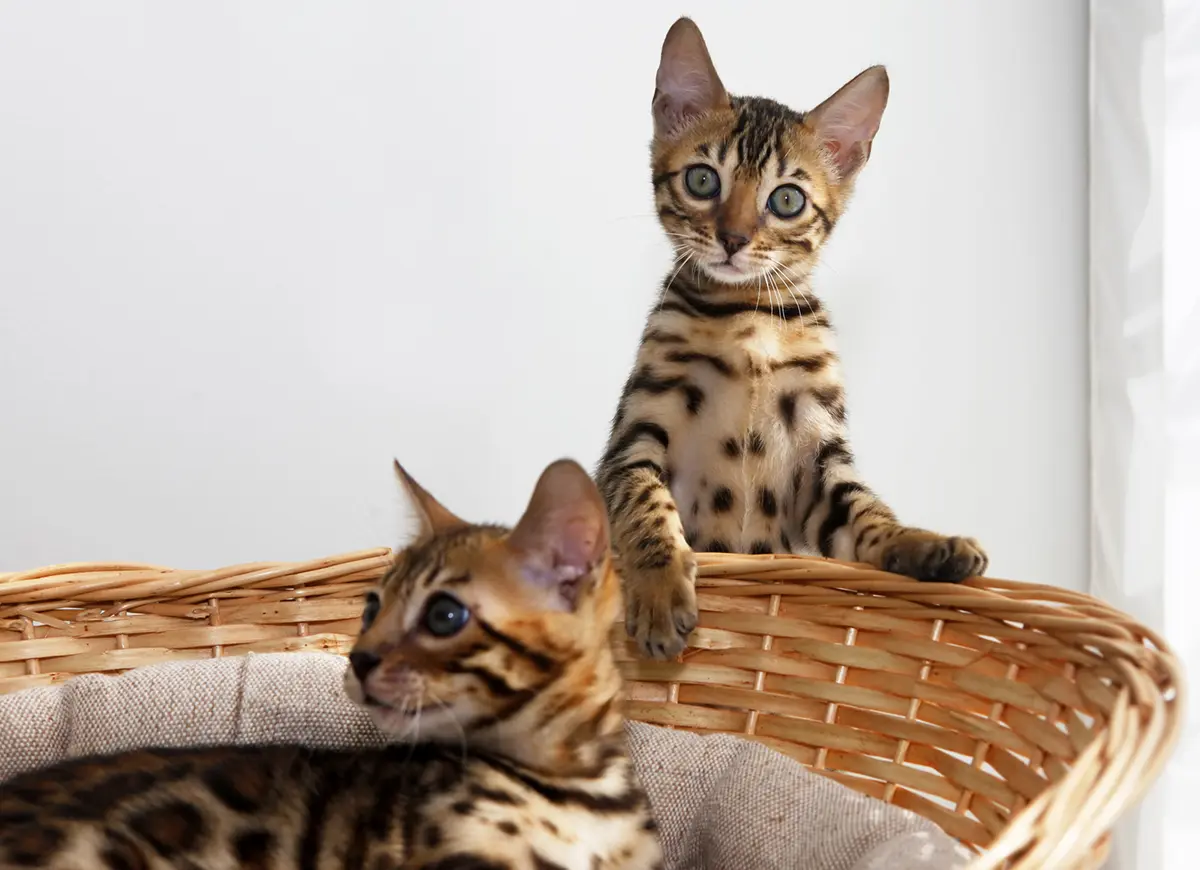
If you own or planning to get a Bengal, you should be prepared for this problem. In this post, you’ll learn more about this topic, how to manage it, and how to improve your Bengal cat’s tummy.
Are Bengal cats prone to diarrhea?
While Bengal cats are cute and active pets, there’s a catch: they are notorious for frequent diarrhea.
Unlike other breeds, Bengal cats have shorter intestines. This is why they tend to experience diarrhea more often.
Despite being commonplace, diarrhea should always be taken seriously. This is much so for Bengal kittens, who are vulnerable to adverse effects if not treated right away.
Why does my Bengal kitten have diarrhea?
As with any pet, diarrhea among Bengal kittens can be due to different reasons. If you’re wondering why your kitty has the runs, the following might be the culprit:
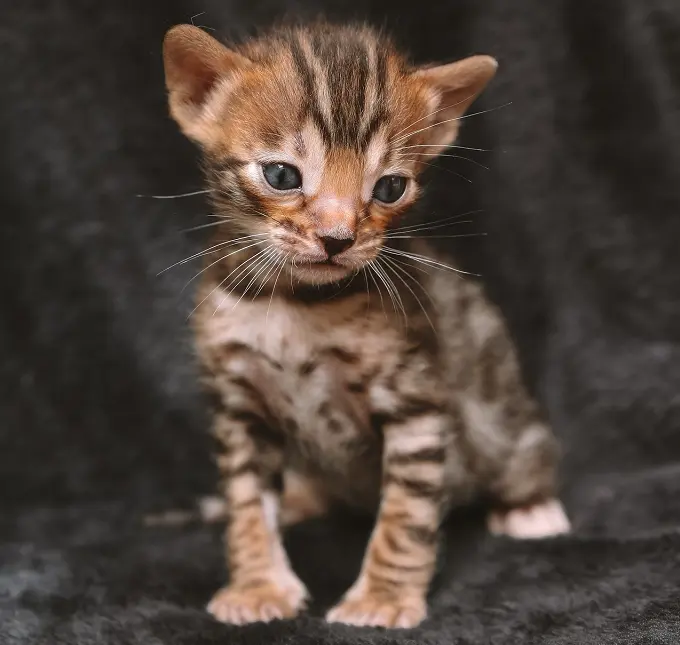
1. Tritrichomonas foetus
The tritrichomonas foetus is one of the main reasons a Bengal cat has diarrhea. This organism accumulates as protozoa in the cat’s small intestines as it continues to reproduce.
In the process, your Bengal cat will suffer from recurring diarrhea. Take note that all cat breeds can get this virus, especially those in catteries, shelters, and households with multiple pets.
This can spread rapidly; if one of your cats has it, the others likely contracted it too. It’s often transferred in a shared litter box. Please read here: Why Does My Cat Sleep In The Litter Box
Moreover, tritrichomonas foetus infection is more observed in younger cats. Immunocompromised Bengal kitties will also have a higher risk of getting this virus.
Aside from being loose, your Bengal cat’s stool will also be very smelly. Weight loss will also set in if the condition remains untreated for long periods.
Most cases of tritrichomonas foetus infection require veterinary attention. It may resolve naturally in some cats, but it doesn’t happen often.
2. Nervousness
Do you know that your Bengal kitten can also have ‘butterflies’? This nervousness can cause stomach upset and eventual diarrhea.
Moreover, Bengal cats that have been brought home for the first time may experience anxiety-related diarrhea. The same goes if your cat is stressed due to changes at home, moving to a new place, or losing a family member.
The good thing is that once the stressor is resolved, your Bengal cat’s tummy will start to calm down. But even though a health problem doesn’t cause this diarrhea, you should still treat it seriously.
3. Wrong diet choice
Regardless of the breed, a wrong diet will wreak havoc on your cat’s tummy. It will trigger diarrhea, vomiting, and even skin problems.
Your Bengal cat may either have an allergy or food intolerance. Both cause diarrhea, but in different ways.
With allergies, your Bengal kitten’s immune system detects a food ingredient as a threat even if it’s not. This sends signals to the stomach to expel the food through diarrhea and vomiting.
Meanwhile, an intolerance may occur if your Bengal cat can’t digest a specific ingredient. The problem occurs in the digestive system, which causes diarrhea just the same.
Even if your Bengal kitten doesn’t have allergies or intolerances, stomach upset can still occur. One reason for this is excessive fiber intake, which makes the stool very loose.
Aside from that, eating too fast can upset a Bengal kitten’s tummy. For cats with short intestines, it’s crucial to curb this habit.
4. Parasites
Recurring diarrhea is one of the hallmark signs of intestinal parasites in both adult cats and kittens. So if your Bengal kitten has diarrhea without any of the mentioned problems, you should have it checked for parasites.
Worms upset a cat’s gastrointestinal tract. This causes diarrhea, vomiting, dehydration, and anemia.
If not addressed immediately, parasites will cause unexplained weight loss and a slew of complications.
The good thing is that worms in Bengal kittens are easy to prevent. With regular deworming and consultation with a veterinarian, your pet can easily avoid or get past this problem.
5. Poisoning
Ingestion of toxic substances is also a common culprit for diarrhea among Bengal cats. Diarrhea is the cat’s way of removing poisonous substances.
You have to be really careful because Bengal cats love hunting mice and other critters. If the mice have been exposed to the poison and have been eaten or bitten by your cat, poisoning will ensue.
Take note that rodenticide poisoning in pets is an emergency. You should call a pet poison hotline or rush your cat to the nearest vet clinic for immediate treatment.
Aside from rat poison, you should keep detergents, fertilizer, and other toxic substances away from your cat’s reach.
6. Bowel diseases
If your Bengal kitten doesn’t have any of the problems above, you should have it checked for bowel diseases. Any cat can develop this problem, but the Bengal breed tends to be highly predisposed due to its intestinal anatomy.
Inflammatory bowel disease is one of the most commonly observed GI problems in cats. This happens when the inflammatory cells invade the feline’s body and thicken the GI tract.
Once this sets in, your Bengal cat will find it hard to absorb nutrients and food. This will lead to bouts of chronic diarrhea.
Take note that inflammatory bowel disease can also be triggered by parasites, bacterial infections, and even allergies.
What do I do if my Bengal kitten has diarrhea?
A cat owner would have to deal with kitten diarrhea at least once in their lives. If your Bengal kitty is currently dealing with this problem, here’s what you can do:
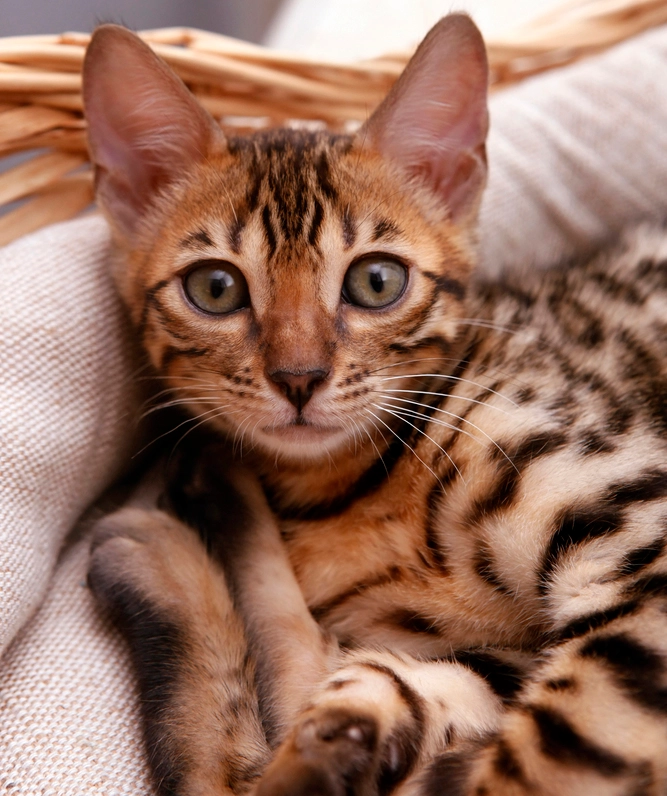
1. Switch your kitten to a bland diet
If your Bengal kitten is having a bout of diarrhea, switch it to a bland diet of rice and boiled chicken. You can mash these food items in a food processor to make it easier for your kitten to eat.
You should also stop giving your kitten treats in the meantime. Your goal should be to give minimum nourishment to prevent upsetting the cat’s stomach even more.
After that, call your cat’s veterinarian for recommendations about what you can do next. You should do this, especially if your kittens’ diarrhea isn’t abating for more than 10 hours.
2. Give your kitten canned pumpkin.
Another good move is to give your kitten a small amount of canned pumpkin. This is rich in fiber and can help reset your kitty’s tummy after a bout with diarrhea.
Aside from that, canned pumpkin has moisture, which can help combat dehydration. Still, you should encourage your cat to keep drinking more.
Take note that you should only give plain pumpkin puree to your pet. Avoid flavored ones and those with other ingredients that can make your cat’s tummy more upset.
3. Encourage your cat to drink more.
Hydration is crucial for Bengal kittens when they are experiencing diarrhea. As much as possible, encourage your cat to drink more fluids.
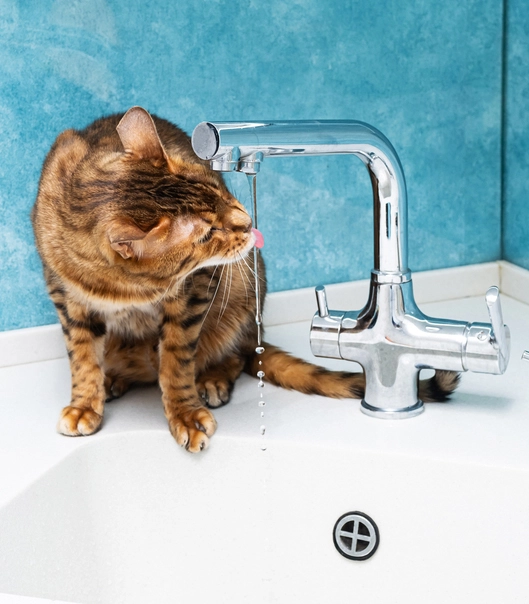
You can use a cat water fountain to entice your cat to drink. Aside from that, you can also add a few drops of freshly steeped green tea into the water for added flavor.
If your cat refuses to drink while having diarrhea, you should consult the vet immediately. This condition can become dangerous in just a matter of hours.
4. Consult the vet for diarrhea medications
If all else fails, you should get the veterinarian involved. Call your cat’s vet to ask for diarrhea medications that you can buy over the counter.
It’s crucial to consult a vet since diarrhea meds for felines need to be administered with a specific dosage. Also, the vet will advise you about the right medication that suits your pet based on its condition and age.
5. Never give kittens human-grade medication.
Lastly, never try to give your cat any human-grade medication for diarrhea. Medications made for humans can cause life-threatening consequences to your pet.
This is due to a few things. First, human medications have a different and often higher dosage than what cats need.
Secondly, human-grade drugs often have ingredients that are toxic to pets. For example, Loperamide, a drug used to treat diarrhea in humans, can trigger severe side effects in felines.
Instead, you should call the vet to get your Bengal kitten the right diarrhea medication. While it costs a fee, this will guarantee your cat’s safety and the efficacy of the treatment.
How to improve your Bengal cat’s digestion
Although Bengal kittens are susceptible to diarrhea, there are ways to improve their gut health. Here are some of the proactive steps you can take:
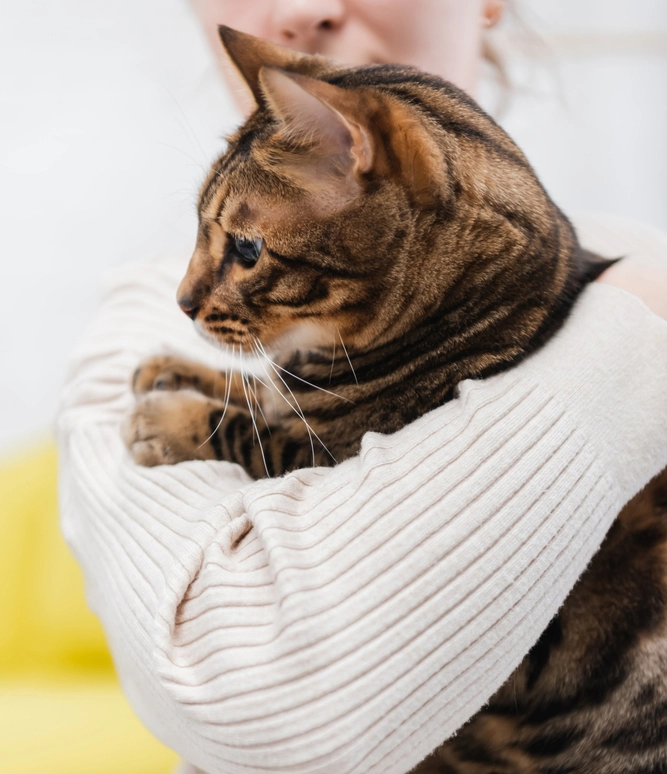
1. Consider a canned diet
Dry cat food products have higher carb content and can be more difficult to digest. In this case, a canned diet would be a great option.
Aside from being softer than kibble, canned food also has added moisture to keep your Bengal cat hydrated. It also has a stronger smell, perfect for finicky eaters.
But before making a switch, you should consult your cat’s veterinarian first. This is to guarantee that you’re giving the right canned food that matches your Bengal kitten’s needs.
2. Add probiotics
Another way to reduce the risk of Bengal cat diarrhea is to boost your pet’s probiotic intake. Probiotics are good bacteria that promote better digestion.
Aside from that, probiotics also improve cats’ immune systems. This will increase your pet’s resistance to infections and other diseases.
One way to do this is to get probiotic-rich cat food. You can also switch to a probiotic treat for a dose of good bacteria.
3. Add the right amount of fiber.
The right amount of fiber is also crucial for a Bengal cat’s diet. Remember that too much fiber can cause feline constipation, and too little fiber will trigger diarrhea.
It’s best to give just the right amount to avoid very loose stools. Your goal should be to firm up your cat’s poop instead of making it too soft or runny.
4. Divide meal servings
Bengal kittens tend to eat too fast, which causes stomach upset and diarrhea. To prevent this from happening, you should divide your entire day’s food into multiple servings.
For kittens under 6 months old, a day’s food serving can be divided into 4 to 5 meals. This way, your cat won’t consume too much food in one sitting and upset its tummy.
Aside from that, I recommend using a slow-feeding bowl for your ravenous eater. This helps slow down cats since they can’t bite down a large chunk of food at once.
5. Consult the vet regularly
Lastly, you should take your Bengal kitten to regular checks with the vet. This way, the kitty will receive immediate treatments in case the vet sees signs of digestive upset.
Don’t wait for your kitten to have chronic diarrhea before consulting the vet. You must actively involve a veterinarian in the early stages of your kitten’s development to ensure its health.
Do Bengal cats have digestive problems?
Bengal cats are known to suffer from gastrointestinal problems. Their delicate digestive system makes them prone to a slew of GI issues.
Proper care is crucial to avoid or reduce this risk. Bengal cat owners should also be meticulous with the diet they are giving.
How often do Bengal cats poop?
Just like any cat, Bengal cats poop at least once a day. Sometimes, your cat may poop twice, depending on how much food it eats and its activity level.
Nevertheless, some cats may poop less, about once every two or three days. This is somewhat normal, but daily potty trips are still best for your pet’s health.
Conclusion
Bengal kitten diarrhea is a common problem among this breed. Due to their sensitive digestive systems, Bengal cats suffer from recurring diarrhea, vomiting, and stomach upset.
It’s important to watch over their diet and get them checked by a veterinarian regularly. This is to ensure that their tummy is always in good condition and less likely to have diarrhea.
